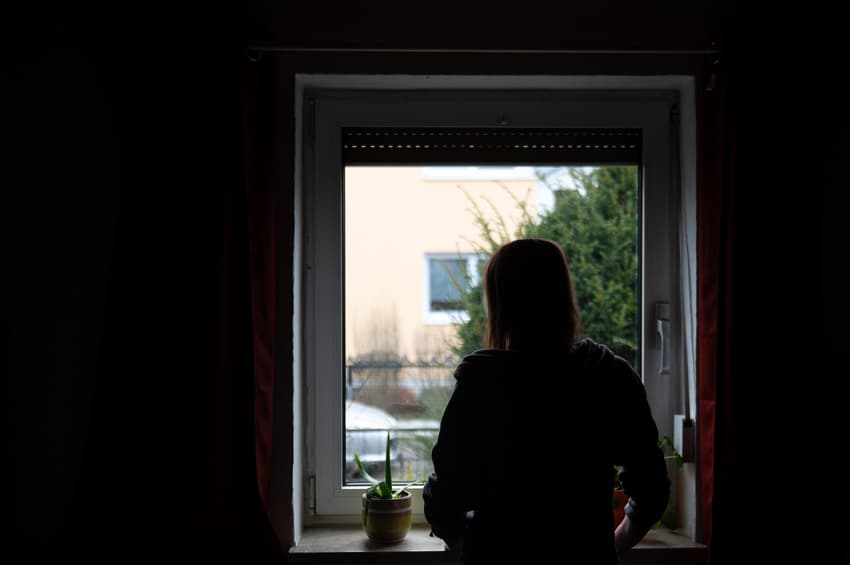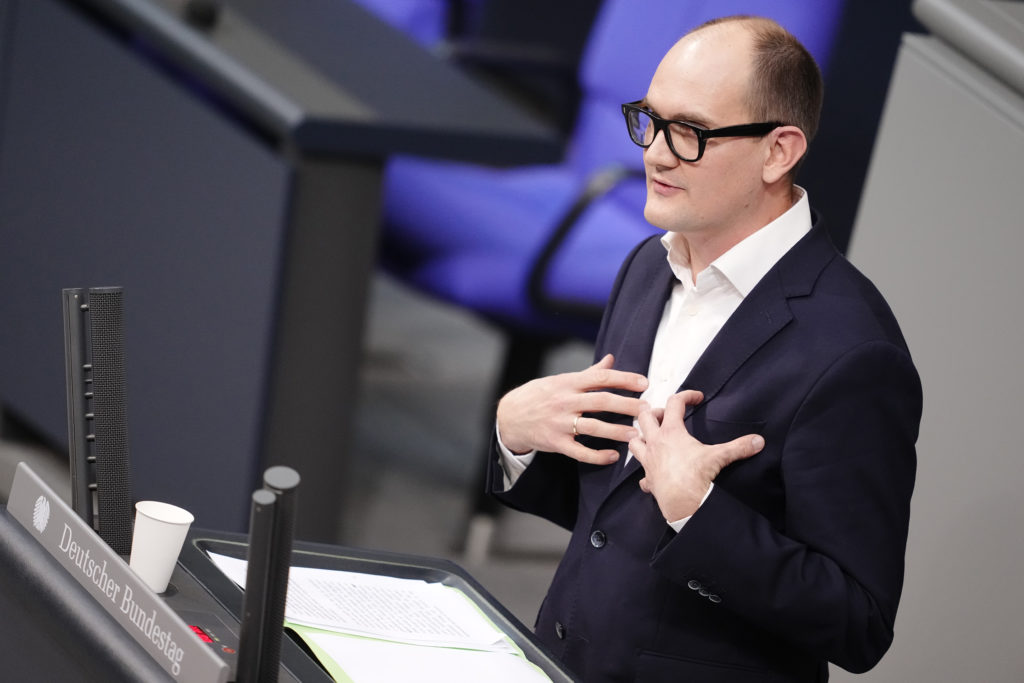How Germany wants to relax Covid quarantine measures

A proposal by Germany's Health Minister shows plans to shorten the Covid quarantine period, as well as putting the focus on personal responsibility.
Read our most up to date story on this topic here: Germany to make Covid quarantine voluntary from May 1st
Most German states have lifted lots of Covid restrictions this week.
And now the strict quarantine measures for people who get coronavirus are also to be significantly relaxed.
That's according to a proposal by the Health Ministry and the Robert Robert Koch Institute (RKI), which health ministers across the states were set to discuss on Monday.
What's the proposal?
According to the plan put forward by the ministry, which is led by the SPD's Karl Lauterbach, people who get Covid-19 would be recommended to isolate themselves for five days and carry out a self test or antigen test after this period. The focus in future will be on voluntary isolation in future - rather than an order from authorities.
Currently, when people get a positive Covid test they have to quarantine for 10 days, with an option to shorten it after a negative test result take on the seventh day.
READ ALSO: What to do if you test positive for Covid in Germany
Under the proposal, however, a five-day isolation obligation would apply to employees of medical and nursing facilities because they work with vulnerable people. They would require a negative PCR test to end their quarantine.
It comes after the health ministers of states called on the federal government last Monday to examine "in a timely manner... whether and for how long isolation of infected persons and contacts is indicated in the current pandemic phase of consequence reduction".
The reason for the planned drastic change is that the requirements for isolation are not practical in the current wave, Lauterbach said last week.
With staff having to stay off for a long time due to quarantine, some industries are being hit hard as Covid travels through the population.
On Monday evening it emerged that the new plan has been agreed, and will come into force on Monday May 1st.
'Personal responsibility'
Speaking before the plan was agreed, a spokesman for the Health Minister said the proposal aims to generally shorten the isolation periods both for infected people and for the quarantine of contact persons to five days, and to get rid of the orders from the health offices that have been customary up to now.
Instead of a quarantine obligation, the authorities should "focus on personal responsibility", Lauterbach spokesman Hanno Kautz told Welt.
"The recommendation is to reduce contacts as much as possible."
In addition, people living in a household with people who have Covid should also voluntarily reduce their contacts.
READ ALSO: EXPLAINED: Germany’s rules and exceptions for Covid quarantine
What's the reaction so far?
It's mixed. The head of the board of the National Association of Statutory Health Insurance Physicians, Andreas Gassen, welcomed the proposal.
"The Omicron wave does bring a lot of infections, but most of them are mild," he said. Against this background, the proposal for new quarantine rules comes at the right time. "We would otherwise run the risk of crippling important infrastructure in Germany," he said.
But the German Foundation for Patient Protection called it worrying that staff shortages were fuelling the political discussion.
"For the sick, those in need of care and vulnerable people, such tactics are highly dangerous," said board member Eugen Brysch.
Green Party health expert Janosch Dahmen also expressed scepticism.

Greens health spokesperson Janosch Dahmen speaks in the Bundestag. Photo: picture alliance/dpa | Kay Nietfeld
"In the current pandemic situation, the range of infection courses is extremely high," he told the Handelsblatt newspaper.
He said there are young vaccinated people whose positive results are asymptomatic, but also "many symptomatic infections that last significantly longer than five days, and there is still a relevant number of severe or chronic courses".
In the case of an infection, "consistent isolation and recovery continue to be necessary in order to recover quickly and completely and not to infect other people", said Dahmen.
An end to isolation is "only possible responsibly after the symptoms have completely subsided and a negative test has been carried out".
The head of the German Hospital Association, Gerald Gaß, said of the proposal: "If it is scientifically comprehensible and harmless to health, a shortening of the quarantine and isolation period is definitely the right thing to do."
Comments
See Also
Read our most up to date story on this topic here: Germany to make Covid quarantine voluntary from May 1st
Most German states have lifted lots of Covid restrictions this week.
And now the strict quarantine measures for people who get coronavirus are also to be significantly relaxed.
That's according to a proposal by the Health Ministry and the Robert Robert Koch Institute (RKI), which health ministers across the states were set to discuss on Monday.
What's the proposal?
According to the plan put forward by the ministry, which is led by the SPD's Karl Lauterbach, people who get Covid-19 would be recommended to isolate themselves for five days and carry out a self test or antigen test after this period. The focus in future will be on voluntary isolation in future - rather than an order from authorities.
Currently, when people get a positive Covid test they have to quarantine for 10 days, with an option to shorten it after a negative test result take on the seventh day.
READ ALSO: What to do if you test positive for Covid in Germany
Under the proposal, however, a five-day isolation obligation would apply to employees of medical and nursing facilities because they work with vulnerable people. They would require a negative PCR test to end their quarantine.
It comes after the health ministers of states called on the federal government last Monday to examine "in a timely manner... whether and for how long isolation of infected persons and contacts is indicated in the current pandemic phase of consequence reduction".
The reason for the planned drastic change is that the requirements for isolation are not practical in the current wave, Lauterbach said last week.
With staff having to stay off for a long time due to quarantine, some industries are being hit hard as Covid travels through the population.
On Monday evening it emerged that the new plan has been agreed, and will come into force on Monday May 1st.
'Personal responsibility'
Speaking before the plan was agreed, a spokesman for the Health Minister said the proposal aims to generally shorten the isolation periods both for infected people and for the quarantine of contact persons to five days, and to get rid of the orders from the health offices that have been customary up to now.
Instead of a quarantine obligation, the authorities should "focus on personal responsibility", Lauterbach spokesman Hanno Kautz told Welt.
"The recommendation is to reduce contacts as much as possible."
In addition, people living in a household with people who have Covid should also voluntarily reduce their contacts.
READ ALSO: EXPLAINED: Germany’s rules and exceptions for Covid quarantine
What's the reaction so far?
It's mixed. The head of the board of the National Association of Statutory Health Insurance Physicians, Andreas Gassen, welcomed the proposal.
"The Omicron wave does bring a lot of infections, but most of them are mild," he said. Against this background, the proposal for new quarantine rules comes at the right time. "We would otherwise run the risk of crippling important infrastructure in Germany," he said.
But the German Foundation for Patient Protection called it worrying that staff shortages were fuelling the political discussion.
"For the sick, those in need of care and vulnerable people, such tactics are highly dangerous," said board member Eugen Brysch.
Green Party health expert Janosch Dahmen also expressed scepticism.

"In the current pandemic situation, the range of infection courses is extremely high," he told the Handelsblatt newspaper.
He said there are young vaccinated people whose positive results are asymptomatic, but also "many symptomatic infections that last significantly longer than five days, and there is still a relevant number of severe or chronic courses".
In the case of an infection, "consistent isolation and recovery continue to be necessary in order to recover quickly and completely and not to infect other people", said Dahmen.
An end to isolation is "only possible responsibly after the symptoms have completely subsided and a negative test has been carried out".
The head of the German Hospital Association, Gerald Gaß, said of the proposal: "If it is scientifically comprehensible and harmless to health, a shortening of the quarantine and isolation period is definitely the right thing to do."
Join the conversation in our comments section below. Share your own views and experience and if you have a question or suggestion for our journalists then email us at [email protected].
Please keep comments civil, constructive and on topic – and make sure to read our terms of use before getting involved.
Please log in here to leave a comment.